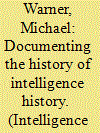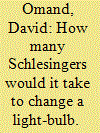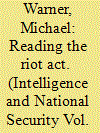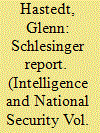|
|
|
Sort Order |
|
|
|
Items / Page
|
|
|
|
|
|
|
| Srl | Item |
| 1 |
ID:
089635


|
|
|
|
|
| Publication |
2009.
|
| Summary/Abstract |
Intelligence historians long worked in the manner of antiquarians, painstakingly piecing together lost worlds from pottery fragments, scaps of manuscripts, and faded inscriptions on broken steles. Today matters have improved for antiquarians and intelligence historians alike. Scientific excavations of thousands of sites tell us how people once lived in them; genealogy can finally tell us who those people were. Intelligence historians, meanwhile, profit from the spreading declassification of originally top-secret documents and gain a better sense of historic intelligence agencies and operations as a whole.
|
|
|
|
|
|
|
|
|
|
|
|
|
|
|
|
| 2 |
ID:
089629


|
|
|
|
|
| Publication |
2009.
|
| Summary/Abstract |
We must be grateful to Michael warner for drawing attention to the declassification of the full report by Dr James Shlesinger, arguing in 1971 the case for reform of the governance and structure of the US intelligence community.
|
|
|
|
|
|
|
|
|
|
|
|
|
|
|
|
| 3 |
ID:
089622


|
|
|
|
|
| Publication |
2009.
|
| Summary/Abstract |
There is a public interest in ensuring that infrastructure systems are appropriately protected and prepared for disruptions. While infrastructure protection is usually viewed as a public responsibility, infrastructure risk management actually requires a high degree of cooperation between the public and private sectors, particularly in the sharing of information about risks to infrastructure. Discussions with Chief Security Officers across sectors of the US economy reveal the complexity of the task, as they describe at length the private sector's requirements of multiples types of information about a range of potential threats. While the US government has established many mechanisms for sharing information, barriers remain that inhibit both the private and public partners from obtaining the information needed to protect infrastructure. Overcoming these barriers requires new thinking about the intelligence generation process, the mechanisms and practices upon which the process relies, and the responsibilities of those in the private sector who participate in it.
|
|
|
|
|
|
|
|
|
|
|
|
|
|
|
|
| 4 |
ID:
089620


|
|
|
|
|
| Publication |
2009.
|
| Summary/Abstract |
The Cuban Missile Crisis is by this point well known to all scholars of international politics. Yet, although it has yielded countless lessons over the years, one critical aspect of the case has remained unexamined: the failure of estimation prior to the crisis that led US officials to discount the possibility of a missile deployment in Cuba. This article re-examines US intelligence estimates of the Soviet Union prior to the Cuban Missile Crisis in light of the concept of 'mirroring risk', introduced in this article. I present a framework for understanding a class of intelligence failures that are caused by the mis-assessment of how an adversary frames a decision and the risks that they are willing to take. I also present a new two-stage process for understanding how individuals assess the risk-propensity of adversaries in international politics.
|
|
|
|
|
|
|
|
|
|
|
|
|
|
|
|
| 5 |
ID:
089627


|
|
|
|
|
| Publication |
2009.
|
| Summary/Abstract |
The difficulty of satisfying competing needs of both national and sub-national officials and commanders for intelligence support capabilities that are too sensitive and expensive to duplicate for both sets of requirements emerged with the growth of industrial-scale imagery and signals intelligence assets and production during the Cold War. The literature of intelligence history and intelligence studies covers the symptoms of this problem, but says less a rigorous and well-documented nature on its causes. Thanks to recent declassifications in the United States, however, we can now read key documents in an American attempt to understand and deal with the dilemma. A study prepared for President Richard Nixon in 1971 and now dubbed the 'Schlesinger Report' has been published virtually intact by the US Department of State. In addition, the Central Intelligence Agency has released two official histories which indirectly have added significant detail to the story. With these new releases, it is now possible to explain the genesis of the Report and chart its effects through the remainder of President Nixon's presidency. The Schlesinger Report marked a watershed for the intelligence community, helping the Nixon Administration to conceive and enact reforms that were both consequential in themselves and presaged the findings of later surveys and inquiries. A better understanding of the Report's background, text, and results can shed light not only the policymaking process in the Nixon Administration but also the trajectory of the intelligence community - and of foreign intelligence establishments that may, in some respects, be following in its path.
|
|
|
|
|
|
|
|
|
|
|
|
|
|
|
|
| 6 |
ID:
089631


|
|
|
|
|
| Publication |
2009.
|
| Summary/Abstract |
A steady parade of congressional hearings and investigations, presidential commisions, and executive orders have addressed the question of how to improve the operation and performance of the intelligence community almost since its founding beginning with the first Hoover Commission.
|
|
|
|
|
|
|
|
|
|
|
|
|
|
|
|
| 7 |
ID:
089624


|
|
|
|
|
| Publication |
2009.
|
| Summary/Abstract |
Twenty-six experienced intelligence scholars and practitioners from seven countries, collaborated to create a short reader, an hour's read for busy people who recognize why ethics matter. This symposium presents summaries of the 13 essays selected for publication.
|
|
|
|
|
|
|
|
|
|
|
|
|
|
|
|
| 8 |
ID:
089633


|
|
|
|
|
| Publication |
2009.
|
| Summary/Abstract |
In the first course of preceding seven years the United States had lost its reputation as a nation standing above rogue nations that ignore international treaties and obligations, violate human and civil rights, and rely on lies, threats and violence to solve their problems, and had acquired the disrepute of the chief nation in the world that arbitrarily decides what is right and wrong, redifines human rights and tortures prisoners, guilty and non-guilty alike.
|
|
|
|
|
|
|
|
|
|
|
|
|
|
|
|
|
|
|
|
|